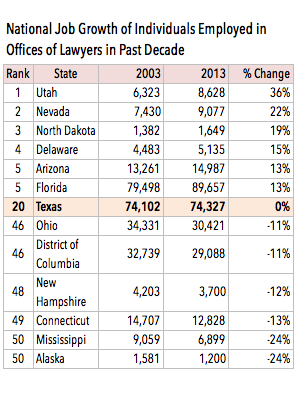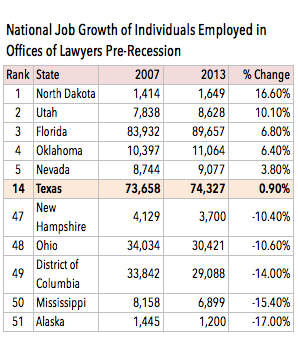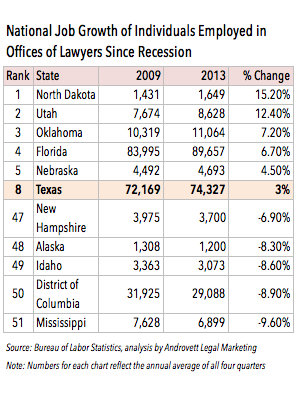© 2014 The Texas Lawbook.
By Natalie Posgate – (September 11) – The legal market in Texas has remained flat in the past decade, but it is still better off than most of the nation’s.
Recent numbers released by the Bureau of Labor Statistics show that no growth has occurred in private legal sector jobs in Texas, while most states are seeing a downturn. The numbers reveal that 23 states experienced growth or no growth from 2003 to 2013. One of the factors isn’t necessarily a lower supply of attorneys, but rather, a shrinking pool of supporting staff at law firms, legal experts say.


A couple of states, namely North Dakota and Utah, have consistently grown over the past decade due to an oil and gas boom that has produced vibrant shale play. Since 2003, North Dakota’s private sector legal market has grown 36 percent and Utah’s has grown 22 percent.
Despite Texas’ market remaining flat over 10 years and pre-recession, BLS’s numbers indicate the Lone Star State’s private legal sector has actually grown by 3 percent since 2009. Texas placed eighth in the nation in 2013 for the states that saw the most growth since the pit of the recession.

“When you’re seeing a net neutral result when everything is generally down, chances are something is really hitting you more exclusively on the plus side,” said Scott Parel, a partner in Sidley Austin’s Dallas office. “There are some big contributors like the energy industry and corporate bases growing in Texas.”
BLS’s numbers, however, do not paint a full picture. The survey, for example, excludes all solo practitioners and only looks at private practice, which counts out all government lawyers and judges. The sample group involves anyone employed full-time in “offices of lawyers,” which could mean an attorney, notary, investigator or other occupation.
Statistics from the State Bar of Texas paint a pretty different picture. According to Cory Squires, the State Bar’s director of research and analysis, the number of in-state, active attorneys in private practice has jumped 21 percent in the past decade – from 41,452 in 2003 to 50,219 in 2013.

The state’s 84,800 licensed attorneys that represent both private and public sectors is up by nearly 28 percent since 2003, but Squires said that number is actually larger because it omits the number of Texas attorneys who are out-of-state.
Legal experts note that a partial factor to the BLS’s stagnant numbers is the idea that firms are no longer employing as many supporting staff members as they traditionally have due to technology advances and other factors.
“There’s always going to be pressure to increase the number of attorneys that go on to personal assistants,” Parel said. “You used to have two attorneys per secretary. Now you’re probably going to see ratios go up to three or four [per secretary].”

John Keville, the managing partner of Winston & Strawn’s Houston office, said one of the factors in the decrease of supporting staff is partially attributed to the new generation of associates.
“Most have laptops, iPads and are used to doing a lot of their own stuff,” he said. “[They’re] unlike a lawyer maybe 30 years ago who grew up marking [letters] up and giving them back to the secretary.”
Still, some firms have seen growth despite the flat market. One is the Dallas law firm Chamblee, Ryan, Kershaw & Anderson, which primarily defends trucking companies and health care providers against litigation. Managing partner Bill Chamblee said the firm has undergone “significant” growth since the recession hit, even in spite of tort reform’s daunting effect on medical malpractice and personal injury litigation.
“It’s not a secret, it’s related to the quality… of the work you do,” Chamblee said. “Nobody is out there trying to figure out how to find an average lawyer.”
© 2014 The Texas Lawbook. Content of The Texas Lawbook is controlled and protected by specific licensing agreements with our subscribers and under federal copyright laws. Any distribution of this content without the consent of The Texas Lawbook is prohibited.
If you see any inaccuracy in any article in The Texas Lawbook, please contact us. Our goal is content that is 100% true and accurate. Thank you.
